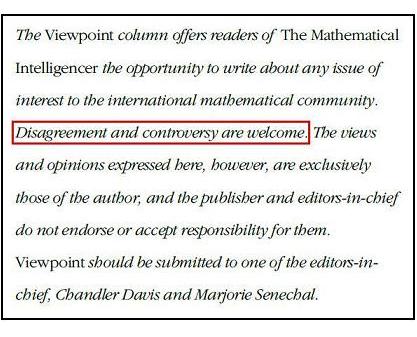 Evolution
Evolution
 Free Speech
Free Speech
Double Censorship: Granville Sewell Can’t Publish Article, Now Denied the Right to Publish His Rebuttal to Critics
ENV readers will recall that last year, University of Texas El Paso mathematics professor Granville Sewell was disallowed from publishing an article in Applied Mathematics Letters (AML) simply because it was (indirectly) critical of Darwinian evolution.
To briefly recap the incident: Sewell’s paper had fully and successfully passed through the peer-review process and was about to be published in AML. Then the Darwin lobby mounted a campaign to pressure AML’s editor into withdrawing the paper.
The editor eagerly capitulated, evidently because he did not want to be perceived as lending sympathy to proponents of intelligent design. Sewell’s paper was never published. It was effectively censored.
Now, Sewell’s critics are being given space in the journal Mathematical Intelligencer (MI) to critique his censored article in AML. Nobody can reasonably object to critics having their say about Sewell’s work, but it’s outrageous that Sewell can’t publish his article staking out his position, while his critics are allowed to publish their article attacking it. In this latest development, Sewell is facing censorship again: MI won’t let him publish his response to critics!
Again, there’s nothing wrong with Sewell’s critics publishing a rebuttal to him in a technical mathematics journal. The problem is that the MI editor has refused to permit Sewell even to publish his response — and this is despite the fact that the preface to the MI piece critiquing Sewell says “Disagreement and controversy are welcome.” See the graphic below from the journal (with the red box added for emphasis):

It’s a little hard to take that claim seriously when MI’s editors won’t let the person being critiqued publish his response.
So Sewell is the victim of double-censorship: he isn’t allowed to publish his ideas in a journal, and then when his ideas are attacked in another journal, he’s not allowed to publish his rebuttal there either. If Sewell’s AML paper was so bad that it didn’t deserve to be published, why do his critics feel the need to rebut it?
Some more details: Sewell submitted a response to his critics in MI as a “letter to the editor,” which, according to the editor, are normally published “as received” (if they are published). His response was nevertheless sent out to a referee, who trashed it, and his “letter to the editor” was accordingly rejected. The editor told him, “You have had your say and [Bob] Lloyd has rebutted you.”
This is highly ironic. Sewell did publish a letter over ten years ago in MI critiquing evolution, so in one sense he has “had his say.” But the conversation has evolved a lot since then, and the rebuttal from Dr. Lloyd in MI explicitly references and critiques Sewell’s most recent article that was censored from AML. Yet MI won’t accept his response.
In short, they are debating a controversy that doesn’t exist and rebutting a paper that was never published, meanwhile barring Sewell from giving his response.
In a forthcoming ENV article, we will be hosting Dr. Sewell’s rebuttal to Dr. Lloyd. ENV readers can then decide for themselves who is right, and whether Sewell deserves the double-censorship to which he has been subjected.
In the meantime, keep repeating to yourself: “There is no controversy over evolution, there is no controversy over evolution, there is no controversy over evolution…”
